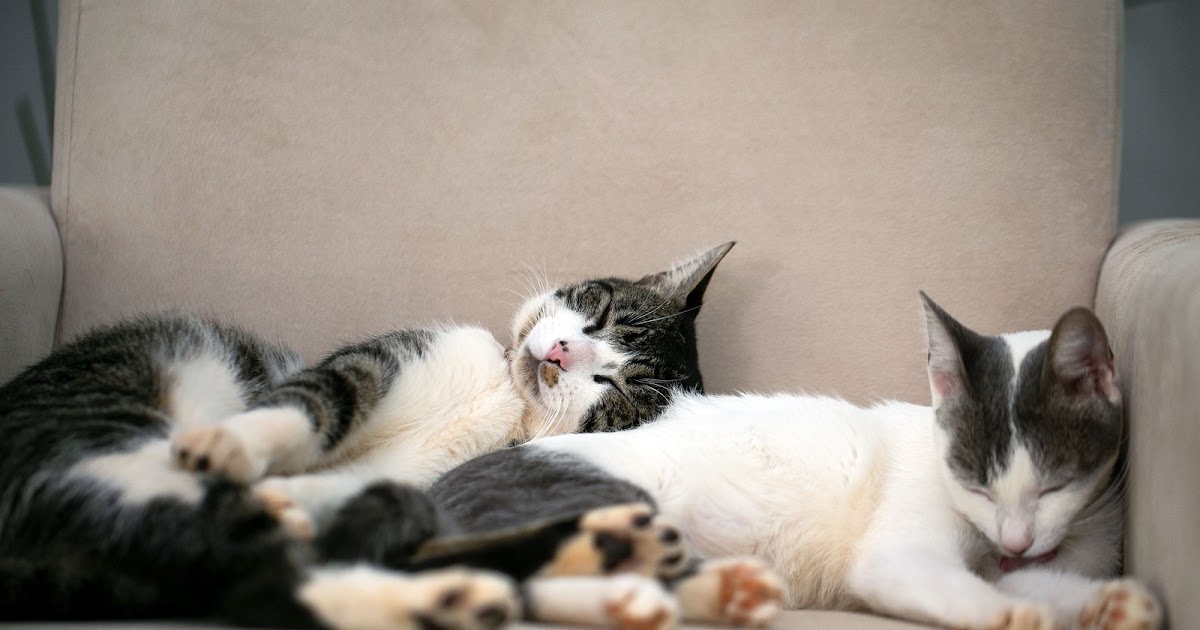These signs of affectionate feline behaviour show that your cats are friends with each other.
| Photo: Fernando Calmon/Shutterstock |
By Zazie Todd PhD
This page contains affiliate links which means I may earn a commission on qualifying purchases at no cost to you.
Get Companion Animal Psychology in your inbox.
If you have more than one cat, it helps a lot if they are good friends. Tension between cats can result in stress for them and perhaps also for you. But how do you know if they are friends?
Here are the signs to look out for.
They greet each other with the tail up. The tail up greeting is when one cat approaches the other with their tail straight up, often with a little hook at the end, a bit like a question mark. You might also see this when your cat approaches you. The tail up is a friendly signal.
| These two cats are touching heads, bodies, and tails, and they’re also showing the tail up signal. Photo: ClementineKANJ. |
They sniff noses. Sniffing the nose is another way that cats who are friends greet each other. Incidentally, dogs who live with cats can learn that this is the right way for them to greet their feline housemate, so you may also see this happen with a dog or you might sniff noses with them yourself. They are also using their nose to get information about the other cat (or you).
| The Companion Animal Psychology logo, by Lili Chin, depicts my tortoiseshell cat Melina sniffing noses with my late dog Bodger. Note how Melina has her tail up. |
They rub their heads together. Sometimes they may even rub their head and their whole bodies together, letting their tails touch or entwine. Head-rubbing deposits pheromones and it’s believed that cats head-rub to build up a group scent. Head-rubbing happens more often when at least one of the cats has their tail up when approaching the other.
| These two cats are resting together, touching, and it looks like they might be about to do some head-rubbing too. Photo: Scalia Media |
They groom each other, typically around the head and neck. This is called allogrooming. It is usually a friendly behaviour in which the other cat cooperates, but sometimes one cat will seem to hold the other down while grooming them. When this happens, maybe it helps to dissipate some tension.
| One cat is grooming the other cat’s ear and top of their head. Photo: Chris Hill/Shutterstock. |
They sleep next to each other. Cats who get along with each other often snuggle together when they rest. Sometimes they even squash into tiny spaces, like the space at the top of a cat tree, to make this happen. They’re not doing this simply to keep warm, because they’ll cuddle together even when it’s hot—it’s a choice to snuggle up with their friend. This is most likely in cats who grew up together as kittens.
| These two cats are cuddled together under a blanket. Photo: Mi Wang/Shutterstock |
They play together. Cats who are friends will engage in rough-and-tumble play that is fun for both of them. You’ll see them take turns (e.g. at being on top or below when wrestling) and change activities during play. You’ll notice that the claws are in and there’s no caterwauling, hissing, or spitting, which would mean it was fighting instead. Chasing can be part of social play, but if it’s one-sided it could also be one cat trying to get away, so pay attention. Kittens play most and older cats play less often, so don’t worry if you see less of this in your older cats.
| Photo: Elisa Putti/Shutterstock |
Another thing you might notice is purring. Cats often purr during friendly interactions, such as when they are cuddled up together, when they rub heads together, or groom each other. You will probably also hear them purr when rubbing their head on you or resting on or next to you, such as when they sit on your lap.
| These two cats are touching heads and bodies. Photo: foxaon1987/Shutterstock. |
Cats who are friends with each other may occasionally have minor disagreements, just like people sometimes disagree with their friends. But on the whole, you’ll see these friendly behaviours from day to day.
One thing you can do to make it easier for your cats to get along is to ensure you are providing the right environmental set-up for them, including multiples of all resources (spread out around the house) so that they don’t have to compete for access to things they need, like food, water, and the litter box. You should also make sure that each cat gets some one-on-one time with you, including playtime.
| Another example of the tail-up signal. Photo:Stokkete/Shutterstock |
Signs that your cats are not getting along would include any obvious signs of tension between them, such as hissing, caterwauling, or fighting. Cats that don’t like each other will not choose to spend time near each other, except when the provision of resources leaves them little choice. A more subtle sign that cats aren’t getting along is when one cat blocks access e.g. by lying across the stairs or in a doorway making it hard for the other cat to get past them.
If you notice a sudden change in your cat’s behaviour, schedule a visit with your veterinarian in case there is a medical cause. If your cats are not getting along, it’s better to do something about it sooner rather than later, so seek help from your veterinarian, a cat behavior consultant, or board-certified veterinary behaviorist as needed.
For tips on how to care for your cat, check out my book Purr: The Science of Making Your Cat Happy.
Useful links:
As an Amazon Associate I earn from qualifying purchases. As an Etsy affiliate and Marks and Spencer affiliate, I earn from qualifying purchases.
